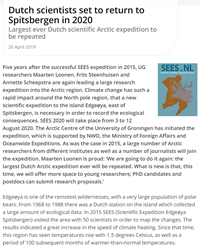Loonen, Dr Maarten

Maarten Loonen is a polar researcher who has been travelling to Spitsbergen for over 25 years to study the behaviour of migratory birds and changes in their living conditions. The Polar regions are unique for researchers as rises in temperature and the consequences for humans, animals and plants are extra visible here. On Spitsbergen, Loonen and other Groningen scientists are studying whale hunting, tourism, mining, ecosystems and the consequences of climate change for migratory birds. In 2014, Loonen was one of the researchers of the University of Groningen that were invited by the Dutch Navy to join an expedition to Jan Mayen island. This was a unique opportunity for the researchers to visit this isolated island. The multidisciplinary research team concentrated on archaeology and biology.
Loonen also charts the flying routes of the arctic tern. To that end he implemented an instrument that was new in academic research – crowdfunding. Loonen was able to fit arctic terns with geolocators and expects to be able to chart the changes in the migratory patterns after a few years. And, because the birds cross the entire globe twice a year, he hopes to gain a better idea of the ecological changes that are taking place worldwide.
Loonen led the largest Dutch polar expedition in history, to the east side of Spitsbergen, in 2015. He was the driving force behind this large-scale research project. The expedition was repeated in 2022.

Previously in the news
- UG mounts new expedition to Svalbard to study climate
- New polar expedition to Spitsbergen headed by UG researchers
- Royal decoration awarded to Maarten Loonen
- Dutch scientists set to return to Spitsbergen in 2020
- Maarten Loonen’s climate change grief
- Largest Dutch polar expedition in history
- Groningen researchers to visit Jan Mayen island with Dutch Navy
- Street view in Spitsbergen (in Dutch)
2024
2023
2022
2021
2020
2019
2018
2017
2016
2015
2014
2013
2012
2011
2010
2009
2008
2007
2006
2005
2004
2003
2002
2001
| Last modified: | 08 January 2025 4.04 p.m. |
